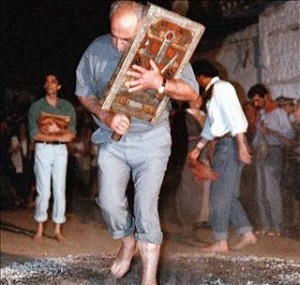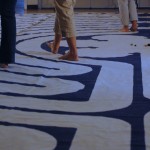Roundtable on Religious Studies and Academic Credibility beyond ‘World Religions’
A while back a few of us gathered for what became the first of a 'successful' bout of roundtables conducted by a cadre of 'amazing people' with differing and 'unique' opinions. In that first ‘test’ for the ones that would follow, six of us gathered together to discuss the ‘future of religious studies.’
A few highlights from that recording are the revelation that what one does with a degree in religious studies inevitably leads toward a fine career at Starbucks, that ‘relativity,’ being one step from ‘subjectivity,’ is the ‘post-modernist quagmire of death and destruction that will consume all academic fields if it’s allowed to spread too far,’ and that we ourselves, despite the wishes of many, are not, in fact, the future of religious studies.
After that first attempt came many others and the RSP has blossomed nicely. A few of us finished the degrees that were at that time ‘in-progress’ and moved on—and away—from Edinburgh. This last September we were given the opportunity—thanks to romance—to all be back in town, and arranged a ‘reunion-of-sorts.’ This time, our conversation was a bit less organized, but by no means less interesting. A few of us had begun working on Ph.D. programs, and a few of us had just entered into the early-to-final stages of those begun around the time of the first recording. We sat in the same seats, in the same room, and sipped the same canned cocktails as before. Interestingly, our positions, opinions, and arguments seem both old and new, the result of time working together, learning each other’s personalities, and becoming closer friends and colleagues. Please share in our discussion, comment, discuss on your own and, as always, thanks for listening.
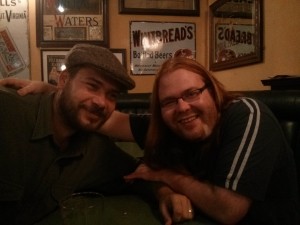
Many thanks to Ethan for penning this prose.
Religion, Spirituality and Health
Religion, spirituality and health – oh my! In this day and age, one might be inclined to ask if these three words, when combined, can contribute anything resembling a 'positive health outcome'. However, Much of the current literature on psychology of religion and its relationship to coping may indicate that belief can contribute positively in the process of coping and meaning making for religious individuals (Park, 2013).
In The Future of an Illusion (1927/1961), Freud viewed religion as “comparable to a childhood neurosis” (p. 53). However, he also noted it as “the most precious possession of civilization” and “the most precious thing it has to offer its participants” (p. 20). While Freud was certainly critical of ‘religion’, he nevertheless understood what Williams James (1975) called its “cash value”. That is, regardless of the truthiness or falsity of religion as an ontological fact, religion can have value for those who practice and believe. According to Dr. Harold Koenig, a leading psychiatrist in the field of religion, spirituality and health, and the Director of the Center for Spirituality, Theology and Health at Duke University Medical Center, one way that religion and spirituality may explicate its cash value is in the realm of physical and mental health.
In his interview with Thomas Coleman conducted at the 2013 Duke University Summer Research Course on Religion, Spirituality and Health, Dr. Koenig broadly discusses the field of religion, spirituality (R/S) and health. He notes that all things being equal people who measure higher on R/S variables typically have improved mental and physical health – carefully relaying that all things being equal is a key component to the relationship. Koenig states that it is not mere identification as R/S that influences health, but sincerity and commitment of belief and action that matters. He mentions the need for ‘secular sources’ in the R/S and health field in order to draw comparisons between the relationship of R/S variables with other variables that may function in a similar manner. In discussing how he operationalizes the variables of ‘religion’ and ‘spirituality’ for research purposes, Koenig emphasizes that importance of definitions of R/S are always in reference to the Transcendent (i.e. defined substantively). In closing, it is clear that the relationship between religion, spirituality and health is complex and multifaceted. If you are interested in learning more about R/S and health research Dr. Koenig invites you check out the Center for Spirituality, Theology and Health website at: http://www.spiritualityandhealth.duke.edu/. Religion may not be a cure for the common cold, but it seemingly can provide one possible source of wellbeing for its adherents in the world today.
You can also download this interview, and subscribe to receive our weekly podcast, on iTunes. If you enjoyed it, please take a moment to rate us. And remember, you can use our Amazon.co.uk, Amazon.ca, or Amazon.com links to support us at no additional cost when you have a purchase to make.
References
- Freud, S., Strachey, J., Freud, A., Strachey, A. & Tyson, A. (1961). The Standard edition of the complete psychological works of Sigmund Freud. London: Hogarth Press.
- James, W. (1975). Pragmatism. Cambridge, Mass.: Harvard University Press.
- Park, C. (2013). Religion and Meaning. In: Paloutzian, R. & Park, C. eds. (2014). Handbook of The Psychology of Religion and Spirituality. 2nd ed. New York: The Guilford Press, pp. 357-379.
THATCamp Roundtable on Digital Religious Studies
At this past year’s meeting of the American Academy of Religion in Baltimore, Maryland, over 70 scholars met to participate in the AAR’s first THATCamp. The Humanities and Technology Camp is an open meeting for those desiring a conference experience outside of the presentation of formal papers. Participants submitted ideas ahead of time to the AAR THATCamp website, but the final shape and content of the event was decided on-site by a vote. In the busy weekend of paper sessions, THATCamp AAR was an oasis of facilitate first, pontificate second. As digital religious studies emerges within the broader digital humanities movement, the Camp was a rather bold move for the AAR, whose interaction has been driven by more conservative timelines.
THATCamp represents one of the bright spots of the digital world and its potential for conference goers. It emphasizes hands-on experience, privileges active learning, and puts expertise and enthusiasm for technology side-by-side. It can be chaotic with its impromptu schedule, but the advantage is the flexibility it offers to solve problems, foster dialogue, and teach digital skills.
Over the course of the day participants had the option to become more familiar with the online curation platform Omeka, learn about the many options for digital publishing, brainstorm ways to harness outside technological expertise for humanities projects, discuss the role of media in the classroom, learn the basics of big data, and even get tips about doing digital ethnography with students. The schedule is still up here, but it was as full a day of information as even the most seasoned technophiles could handle.
For the conference organizers that sat together for a few brief minutes over lunch, there was awareness of both the promises and perils of the digital world. As a fledgling research method whose products are varied and often unique, there is a great need for clear standards of evaluation of “good scholarship in the digital realm.” This should be of special concern to early career scholars who may have to fight for the presence of digital work in their tenure portfolios or in grant applications. This problem would be addressed not only by the development and promotion of open platforms for scholarly work, but also by sincere discussion about basic digital literacy and professionalization with digital tools and methods. Publishers, professional organizations, libraries, departments, scholars, and students--everyone in the academic chain will need to work out their roles for digital methods and digital work.
With so little time, several questions were pre-circulated to help things move along quickly on these topics.
What does it mean to teach or research religious studies digitally?
Does religious "data" make digital religious studies distinct within the digital humanities?
What is a digital religious studies research project you think more people should know about?
How can departments and the field better support digital methods and pedagogies?
For each of the six participants, digital methods and platforms are a key element in their identity as scholars. While there was not an opportunity to to fully explore their contribution and work, if you would like to learn more about them, please use the links below:
- David McConeghy, Independent Scholar of Religious Studies
- Hussein Rashid, Visiting Professor in Religion at Hofstra University
- Jeri E. Wieringa, PhD Candidate in History at George Mason University.
- Chris Cantwell, Assistant Professor of History at University of Missouri-Kansas City
- Lincoln Mullen, PhD Candidate in History at Brandeis University
- Nathan Schneider, author of God in Proof and Thank You, Anarchy.
You can also download this interview, and subscribe to receive our weekly podcast, on iTunes. If you enjoyed it, please take a moment to rate us. And remember, you can use our Amazon.co.uk, Amazon.ca, or Amazon.comlinks to support us at no additional cost when you have a purchase to make.
Sources of Meaning and Meaning in Life – An interview with Tatjana Schnell
Psychiatrist and Auschwitz concentration camp survivor Viktor Frankl’s seminal book, Man’s Search for Meaning (2006), placed an emphasis on the search for and construction of meaning, as a prima facie component of the human condition. Moreover, Frankl proposed that meaning could be found in even the most malignant and desolate of places – even in “the midst of Nazi death camp hell” (p.51). According to this view humans are not only creatures of meaning, but willed to find meaning.
Recently, scholars have placed the concept of ‘meaning making’ as an important area of focus within psychology of religion (Paloutzian & Park, 2005; 2013). Some people find meaning in religious or spiritual experience and beliefs while others find meaning on more secular mediums in life. One way comparisons among religious or secular individuals and worldviews can be made is at the level of ultimate meanings. However, if humans are truly on a “search for meaning”, as Frankl has argued, what might be some of the sources of such meaning?
In her interview with Thomas Coleman recorded at the 2013 International Association for the Psychology of Religion World Conference, Dr. Tatjana Schnell discusses on-going research conceptualizing and measuring sources of meaning and meaning in life. Her work has been examined internationally with promise of cross-cultural application (Silver, Bernaud, Pedersen, Birkeland, la Cour & Schnell, 2013). What makes her work particularly interesting is that meaning making is not dependent on any particular modal identity or value system but rather the profound experience one has in their life.
Schnell begins the interview by explaining the methodology behind the construction of her Sources of Meaning and Meaning in Life Questionnaire (SoMe). She goes on to emphasize the role that meaning plays in not only religious individuals but also the growing secular population around the world. Dr. Schnell discusses ultimate sources of meaning, making space for both secular and religious experiences of transcendence termed horizontal and vertical transcendence. Throughout the podcast Dr. Tatjana Schnell’s message is clear, ultimate sources of meaning in life come from many areas and are meaningful to different people and for different reasons. Some find meaning in religion, others find meaning in more secular ways. Regardless of the label used, meaning is central to the human condition. Towards the end of the interview Schnell builds on an old quote by John Stuart Mill. Schnell asks is it better “to be a satisfied cow, or an unsatisfied Socrates”?
You can also download this interview, and subscribe to receive our weekly podcast, on iTunes. If you enjoyed it, please take a moment to rate us. And remember, you can use our Amazon.co.uk, Amazon.ca, or Amazon.com links to support us at no additional cost when you have a purchase to make.
References:
- Frankl, V. E. (2006). Man's search for meaning. Boston: Beacon Press.
- Paloutzian, R. F. & Park, C. L. (2005). Handbook of the psychology of religion and spirituality. New York: Guilford Press.
- Paloutzian, R. F. & Park, C. L. (2013). Handbook of the Psychology of Religion and Spirituality, Second Edition. Guilford Publications, Incorporated.
- Silver, C. F., Bernaud, J. L., Pedersen, H. F, Birkeland, M. H., la Cour, P. & Schnell, T. (2013) Three cultural comparisons and inferences using the Sources of Meaning and Meaning in Life Questionnaire. Presented at the biannual meeting of the International Society for Psychology of Religion in Lausanne Switzerland.
Demons, possessions, and exorcisms: Sean McCloud on “Spiritual Warfare”
How should one approach the study of demons and spiritual warfare? In this conversation with University of North Carolina, Charlotte professor Sean McCloud, demons, possessions, and exorcisms that might have once been considered fringe or marginal elements of the American religious scene are now part of a robust “haunted” or supernatural landscape.
Today the spiritual warfare movement that began in mission fields in South America and Africa is now institutionalized in the charismatic New Apostolic Reformation churches as well as popularized in film and cinema. Where should we place haunted objects in the world of religious studies? What do we do with figures like Peter Wagner who led the supernatural movement and then found himself attacked by his allies?
What we find is a transnational interest with demons that has yet to be fully charted or explained. McCloud argues that rising supernatural interest coincides with consumerism and neoliberal capitalism. In the spiritual warfare manuals that serve as his primary data, capitalist and even therapeutic language seems to mark this as a product that borrows from a wide range of 20th century themes. Even perceived enemies of evangelicalism—like the soft metaphysical stylings of The Secret—become fodder for incorporation into the spiritual warfare paradigm. Welcome to the supernatural turn!
You can also download this interview, and subscribe to receive our weekly podcast, on iTunes. If you enjoyed it, please take a moment to rate us. And remember, you can use our Amazon.co.uk, Amazon.ca, or Amazon.com links to support us at no additional cost when you have a purchase to make.
“Unruly Angels”: An Interview with Ingvild Gilhus
 What is an angel, and why have they exerted such a fascination on the public imagination since antiquity up to the present day? In this interview with David Robertson (our 100th "official" podcast!), Ingvild Gilhus, a historian of religion with considerable experience in dealing with popular religion in both the ancient and modern worlds, discusses where the concept of angels comes from and how they have been variously constructed, from the white-suited messengers of the New Testament to the embodiment of the "higher self" in New Age accounts.
What is an angel, and why have they exerted such a fascination on the public imagination since antiquity up to the present day? In this interview with David Robertson (our 100th "official" podcast!), Ingvild Gilhus, a historian of religion with considerable experience in dealing with popular religion in both the ancient and modern worlds, discusses where the concept of angels comes from and how they have been variously constructed, from the white-suited messengers of the New Testament to the embodiment of the "higher self" in New Age accounts.
In particular, she explains that angels seem always to break boundaries. Neither human nor god, male nor female, whether Christian or otherwise, angels seem always to have functioned as representatives of an unruly popular religious impulse which seems to sit just below the elite constructions with which the study of religion has traditionally concerned itself.
You can also download this interview, and subscribe to receive our weekly podcast, on iTunes. If you enjoyed it, please take a moment to rate us. And remember, you can use our Amazon.co.uk, Amazon.ca, or Amazon.com links to support us at no additional cost when you have a purchase to make.
Oh, and stay tuned at the end for two special guest appearances!
Authors meet Critics: “New Age Spirituality”
Following from our interview on Monday with Ingvild Gilhus, today's podcast presents an "authors meet critics" session on the new edited volume by Ingvild Gilhus and Steven Sutcliffe, New Age Spirituality: Rethinking Religion. This was recorded at the University of Edinburgh at the launch of the book, and features the editors, Steven Sutcliffe and Ingvild Gilhus, and critics Bettina Schmidt, Marion Bowman and David Robertson, and was ably hosted by Afe Adogame.
Steven Sutcliffe introduces the book, describing the plan to curate a volume which approaches empirical research into "New Age" religiosity through broader "theories of religion". As Gilhus then suggests, our theoretical positions are impoverished if they don't address "religion" in both classical and modern contexts.
Marion Bowman takes this up in her response, which addresses the similarity between this project and her own "vernacular religion" project. Bettina Schmidt addresses this disconnect between theories of popular and institutionalised religion from a anthropological point of view, pointing out that many phenomena have been removed from sociological view due to their perceived marginality, and because they don't offer a clear box to be ticked in censuses. Finally, David Robertson critiques how the critique of "New Age" is positioned within academic, practitioner and popular discourses, and how it may reinforce, despite itself, the very categories it seeks to dissolve.
For anyone interested in New Age, the intersection between category formation - and the practicalities and politics of challenging them - this episode will be essential listening.
The Burning Saints, Fire-Walking Rituals of the Anastenaria
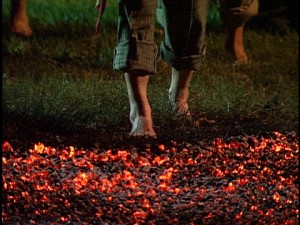 It’s dark outside. The moon hangs in the sky and the soft smell of smoke permeates the warm air as it stings your eyes. Looking down, you notice the glow from burning coals, as hot as 535 degrees C, scattered on the ground below. The trancelike rhythm from the beating drums fills your ears as the Patron Saints Constantine and Helen are honored in the town of Agia Eleni in Northern Greece. The whole village surrounds you and they share in your moment, as the richness of the surrounding imagery and importance of the ritual consumes the senses. You are in a sublime state of ecstasy as the glowing coals lay before you. But, will you walk across? When Saint Constantine calls you to become a firewalker – you answer - at least if you are one of the Anastenaria.
It’s dark outside. The moon hangs in the sky and the soft smell of smoke permeates the warm air as it stings your eyes. Looking down, you notice the glow from burning coals, as hot as 535 degrees C, scattered on the ground below. The trancelike rhythm from the beating drums fills your ears as the Patron Saints Constantine and Helen are honored in the town of Agia Eleni in Northern Greece. The whole village surrounds you and they share in your moment, as the richness of the surrounding imagery and importance of the ritual consumes the senses. You are in a sublime state of ecstasy as the glowing coals lay before you. But, will you walk across? When Saint Constantine calls you to become a firewalker – you answer - at least if you are one of the Anastenaria.
In his interview with Thomas Coleman for The Religious Studies Project, experimental anthropologist, Dr. Dimitris Xygalatas, discusses his ethnography of the fire walking rituals of the Anastenaria. The Anastenaria are Orthodox Christians in Northern Greece who celebrate the Saints Constantine and Helen in a two part ritual cycle each year. They have no written texts, as the tradition and myths encompassing the firewalkers are passed down orally through story telling and by participation in ritual. Their tradition is, as Xygalatas writes (2012, p. 2) “a good example of a physically and emotionally arousing ritual, and such rituals raise a very important question regarding their participants’ motivation: why do people engage in extreme, costly ritual activities, that offer no obvious advantage but entail evident risks?” Widely known and respected for bringing experimental methods into the tough and fast paced conditions entailed by fieldwork on extreme rituals, Xygalatas combines rich description with scientific explanation to present a portrait of the Anastenaria that holds firm to the ‘anthropological attitude’ of understanding, while also providing an explanation for why people may behave the way they do.
The interview begins with a discussion of the cultural context of the Anastenaria in Greece, noting widespread discrimination against their religious practices by the government and Greek Orthodox Church. He explains some of the shared beliefs the Anastenaria hold and describes the ritual cycle for the festival of St. Constantine and St. Helen. But, why would anyone be compelled to walk across burning coals? Xygalatas goes on to highlight the underlying cognitive and physiological mechanisms that may contribute to participation in extreme rituals, discusses the transmission of beliefs and revelation in the Anastenaria and highlights the importance and meaning of the rituals. In closing, Dr. Xygalatas shares a very personal moment from additional fieldwork in Spain that turned himself, the researcher, into the subject being researched.
You can also download this interview, and subscribe to receive our weekly podcast, on iTunes. If you enjoyed it, please take a moment to rate us. And remember, you can use our Amazon.co.uk, Amazon.ca, or Amazon.com links to support us at no additional cost when you have a purchase to make.
References
Book Reviews, May, 2014 – Graham Harvey, Morgan Luck, and James Cox
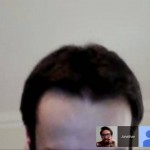 Publishers just keep asking us to review their books. And who are we to refuse? Free books! So we've now decided to make book reviews a regular feature of the RSP. The format is exactly the same as it was previously. We handed out a few books to some of our friends and sat them down (or at least tried in one case) to have a discussion on what they thought.
Publishers just keep asking us to review their books. And who are we to refuse? Free books! So we've now decided to make book reviews a regular feature of the RSP. The format is exactly the same as it was previously. We handed out a few books to some of our friends and sat them down (or at least tried in one case) to have a discussion on what they thought.
In this Book Review session we have:
full review here.
full review here.
You can read his full review here.
More sessions to come soon! If you have any suggestions for books that you think we should review, or would like to do a review yourself then send an email to our book review editor -jonathan@religousstudiesproject.com.
The Psychology of Prayer: An interview with Kevin Ladd
 Prayer. Communicating with a Transcendent deity is a nearly universal and integral part of many ‘religions’ around the world. For many western traditions, prayer can be done anywhere, at anytime and by anyone. There are even Dr. Kevin Ladd.
Prayer. Communicating with a Transcendent deity is a nearly universal and integral part of many ‘religions’ around the world. For many western traditions, prayer can be done anywhere, at anytime and by anyone. There are even Dr. Kevin Ladd.
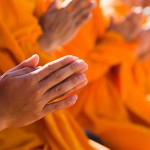 In his interview with Thomas Coleman, Dr. Ladd gives an overview on the psychology of prayer. Ladd begins the interview by discussing what it means to pray. Perhaps most important, he explains how prayer is defined for research purposes, emphasizing that there is no essential definition, nor is one desirable. In taking care to uphold a scientific understanding of prayer, rather than a theologically apologetic one, Ladd understands prayer as a “psychological phenomena”, but with a “theological sensitivity to it”. In other words, we can understand prayer from a scientific point of view while also recognizing its (typically) theological basis. Ladd covers ‘types of prayer’ noting that there is more than one way to categorize differences in prayer. However, is there a secular source or equivalent for prayer? Are there differences between males and females? Does an individual’s age make a difference? Furthermore, if you want to know what a small army of undergraduate researchers, digital cameras, ‘casually dressed’ mannequins, and a labyrinth have to do with prayer research be sure to listen to the interview.
In his interview with Thomas Coleman, Dr. Ladd gives an overview on the psychology of prayer. Ladd begins the interview by discussing what it means to pray. Perhaps most important, he explains how prayer is defined for research purposes, emphasizing that there is no essential definition, nor is one desirable. In taking care to uphold a scientific understanding of prayer, rather than a theologically apologetic one, Ladd understands prayer as a “psychological phenomena”, but with a “theological sensitivity to it”. In other words, we can understand prayer from a scientific point of view while also recognizing its (typically) theological basis. Ladd covers ‘types of prayer’ noting that there is more than one way to categorize differences in prayer. However, is there a secular source or equivalent for prayer? Are there differences between males and females? Does an individual’s age make a difference? Furthermore, if you want to know what a small army of undergraduate researchers, digital cameras, ‘casually dressed’ mannequins, and a labyrinth have to do with prayer research be sure to listen to the interview.
You can also download this interview, and subscribe to receive our weekly podcast, on iTunes. If you enjoyed it, please take a moment to rate us. And remember, you can use our Amazon.co.uk, Amazon.ca, or Amazon.com links to support us at no additional cost when you have a purchase to make.


